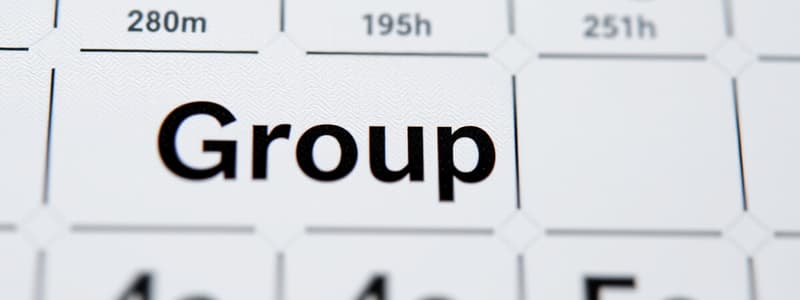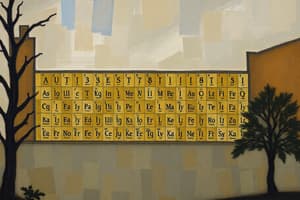Podcast
Questions and Answers
Which group in the periodic table has 2 valence electrons?
Which group in the periodic table has 2 valence electrons?
- Group 2 (correct)
- Group 17
- Group 13
- Group 1
What are some examples of elements from Group 2?
What are some examples of elements from Group 2?
Beryllium, Magnesium, Calcium, Radium
What is the valence electron count for Group 13?
What is the valence electron count for Group 13?
3 valence electrons
Which of the following is an example of an alkali metal?
Which of the following is an example of an alkali metal?
List three examples of alkaline-earth metals.
List three examples of alkaline-earth metals.
What defines transition metals?
What defines transition metals?
What are the elements in the lanthanide series?
What are the elements in the lanthanide series?
Which group contains nonmetals with 7 valence electrons?
Which group contains nonmetals with 7 valence electrons?
What is distinctive about Group 18 elements?
What is distinctive about Group 18 elements?
What is an example of a noble gas?
What is an example of a noble gas?
The ______ is associated with alkali metals because it has only 1 valence electron.
The ______ is associated with alkali metals because it has only 1 valence electron.
What is the definition of a group number in the periodic table?
What is the definition of a group number in the periodic table?
Flashcards are hidden until you start studying
Study Notes
Group 2: Alkaline-Earth Metals
- Elements have 2 valence electrons, indicating reactivity.
- Examples include Beryllium, Magnesium, Calcium, Strontium, Barium, and Radium.
- Less reactive than alkali metals (Group 1).
Group 13
- Elements possess 3 valence electrons, deducing the "1" in double-digit group numbers.
- Aluminum is a key example.
- 3rd ionization energy represents energy required to remove a third electron from a cation, with a value of 6913 kJ/mol for Na2+.
Group 1: Alkali Metals
- Characterized by having 1 valence electron, resulting in high reactivity.
- Includes Lithium, Sodium, and Potassium.
Group 3-12: Transition Metals
- Properties of these metals vary widely but retain metallic characteristics.
- Common examples are Iron, Gold, Zinc, Silver, and Copper.
Lanthanides and Actinides Series
- Located in two rows at the bottom of the periodic table, comprising transition metals from periods 6 and 7.
- The top row, the Lanthanide series, includes elements from Lanthanum (atomic number 57) to Lutetium (atomic number 71).
- Examples include Neodymium, Thorium, and Europium.
Group 17: Halogens
- Composed of nonmetals with 7 valence electrons.
- Notable elements include Fluorine, Chlorine, Bromine, Iodine, and Astatine.
Group 18: Noble Gases
- Unreactive nonmetals with a complete outer electron shell containing 8 electrons.
- Examples include Helium, Neon, Argon, Krypton, Xenon, and Radon.
- Helium is notable for its small size, and is commonly used to fill balloons for floating.
Hydrogen
- Though associated with alkali metals due to having 1 valence electron, Hydrogen is nonmetallic and very reactive.
- Has only one electron level, making it unique compared to alkali metals.
Studying That Suits You
Use AI to generate personalized quizzes and flashcards to suit your learning preferences.




